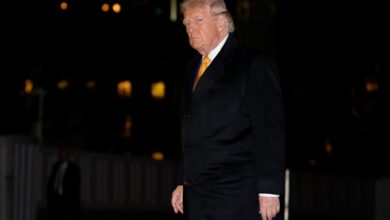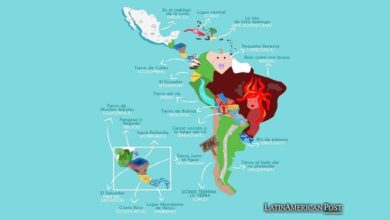Elections in Turkey: The Regional Power that Flirts with Europe
Turkey's elections show the incredible situation of Recep Tayyip Erdogan, the Turkish conservative leader who sees his authoritarian regime stagger.

Photo: Russian Presidential Executive Office
LatinAmerican Post | Santiago Gómez Hernández
Listen to this article
Leer en español: Elecciones en Turquía: la potencia regional que coquetea con Europa
Recep Tayipp Erdogan is perhaps the most powerful man in Turkey and the most influential political figure since Mustafa Kemal Atatürk. He has served as Turkey's prime minister or president since 2003, almost 20 years, positioning him as an authoritarian leader and close to conservative movements and parties. However, in the last elections, the opponent Kemal Kılıçdaroğlu gave a surprise. Although many optimists saw him as the winner, he still forced a second round.
Who is the Man who will be able to Defeat Erdogan?
Kemal Kılıçdaroğlu is the leader of the Republican party. He was a longtime politician and former candidate for the Mayor of Istanbul in 2009 when he obtained 36.8% of the vote. He has been the leader of the opposition since 2010, leading the same party as Atatürk, with which he is the father of the modern Turkish Republic. He led a process of liberalism that, in recent years, has been regressing in the Erdogan government, which is close to the most conservative and religious groups. His speech to return to a secular government, away from conservative groups, and with center-left policies.
Kemal is a prominent opponent of Erdogan, which has led to legal problems. After he questioned the alleged detention of several Turkish academics and insinuated that they were carried out following the instructions of a dictator. This led him to be prosecuted for "insulting the President of the Republic."
Also read: What Alternatives does Ukraine Have to Harm Russia?
When the scrutiny approached 100%, the reality was evident: neither of the two primary candidates would reach 50% of the total votes. This means that Turkey's presidency must be decided in the second round. The waiting time will not be extended. On May 28, the Turks will have to go back to the polls, with the only option of choosing between the current president or a radical change in the government.
For now, the only victory Erdogan can claim is a majority in the Turkish parliament. In the legislature, the AKP, the government party, held majorities with 35.58%, followed by the opposition CHP with 25.33%. However, in Turkey, the presidential regime leaves the legislature with little power, so the real victory is in the presidential race.
Erdogan's Role on the World Stage
Erdogan's Turkey opted for clear independence. This is an influential regional leader. Sometimes it serves as a bridge between Vladimir Putin and the West. It plays a decisive role as it is the outlet to the Mediterranean Sea for the Russian fleet and the trade of various countries in the Black Sea, today the center of the conflict between Ukraine and Russia.
For example, Erdogan keeps Turkey in NATO and shares military bases with the West on its territory. But the same president was also in charge of blocking the entry of new countries, an aspect that always reassured Moscow.
Although it constantly tried to enter the European Union, challenging authoritarianism and the political and religious persecution of minorities was always a fundamental problem for progressive countries. However, this is also one of the reasons why Erdogan decided to consolidate his leadership away from Europe.
Furthermore, Erdogan wanted to position himself as the leader of the Islamic world. Not long ago, he spearheaded the diplomatic rejection of Islamophobic policies within Europe. Likewise, he turned the temple of Hagia Sophia into a mosque and led the voices of millions of Turks and Muslims in the West.
Kılıçdaroğlu in the International Framework
The current leader of the opposition could represent a significant change in Turkish foreign policy. The leader would have a more direct path to cooperate with central governments in Europe and North America. This implies an evident imbalance on the world board that Europe, the United States, China, and Russia compete today. Not counting the balance sheets of the regional powers in the Middle East: Saudi Arabia, Israel, Iran, and Turkey. Kılıçdaroğlu would also be an essential ally on migration and security issues.
Even depending on the agreements reached, Turkey's eventual entry into the European Union is much more feasible with Kılıçdaroğlu at the helm. The first country with a Muslim majority within the group, with a strong workforce, could change the group's future. For this, he must avoid Islamophobic speeches and messages within European politics.
This could also be an apparent setback for Russia's policy. Moscow has always found in Erdogan, an independent man who serves as a bridge and containment for the interests of the United States and the West. With Turkey closer to Europe, Putin will continue to feel increasingly surrounded by hostile governments, which could force him to concede peace in Ukraine sooner than expected or, conversely, to a more belligerent stance.
Impact in Latin America
Although Turkey is a strong regional power in the Middle East and Eastern Europe, it also influences Latin America. In recent decades, Erdogan has positioned himself as a close friend and partner of countries facing democratic challenges in the region: such as Daniel Ortega and Nicolás Maduro.
Due to the sanctions imposed on Venezuela, the South American country has strengthened ties with its Eurasian ally. Not only because it is now dedicated to refining gold in Turkey instead of Switzerland but because of various business ties in different areas, including energy.





